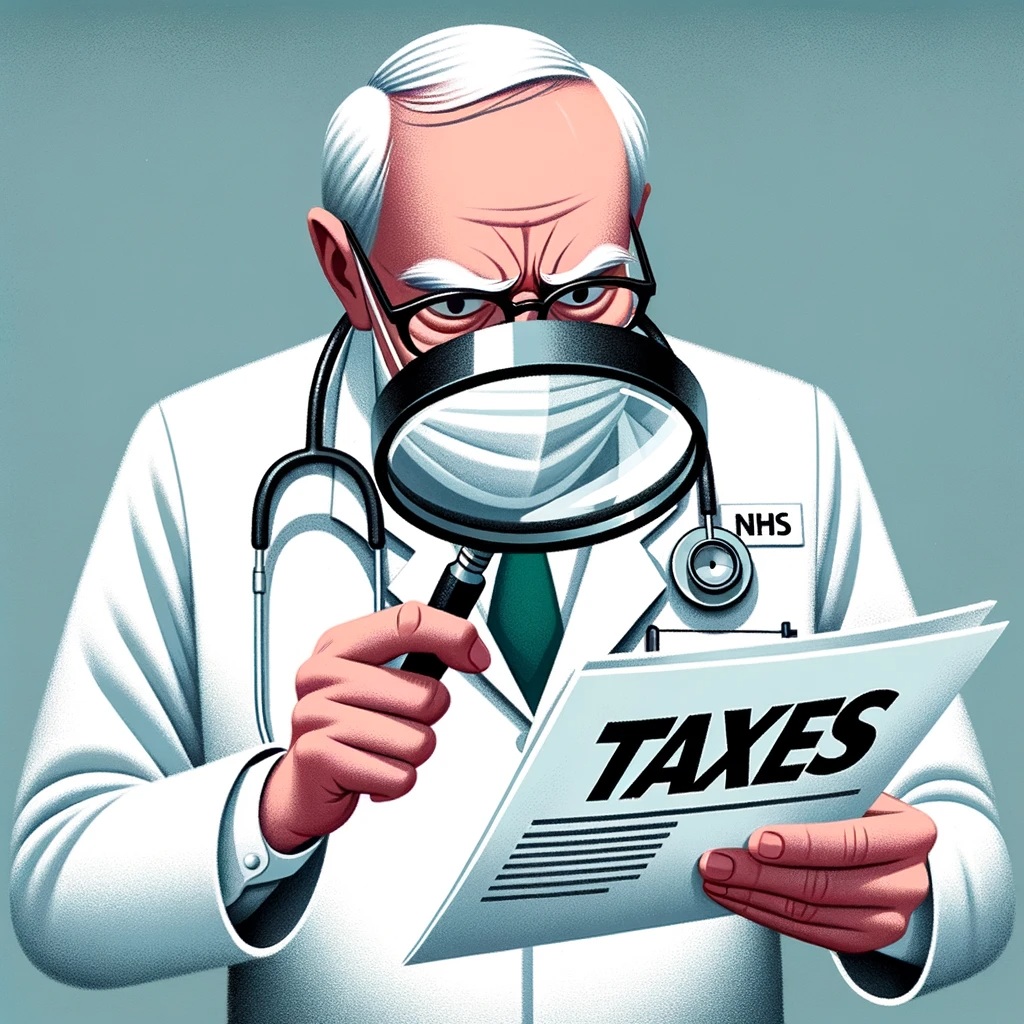Navigating the maze of the UK tax system can be a formidable task, especially for someone engrossed in the relentless world of surgery.
Over the years, I’ve acquired some insights that might make this journey less daunting for my fellow NHS surgeons.
1. Income Tax:
Like every working individual in the UK, NHS surgeons are subject to income tax. Our salaries are taxed based on income bands.
For instance, if I earn up to £50,270 beyond my tax-free allowance of £12,570 (for the tax year 2022/2023), I’ll be taxed at the basic rate of 20%. If I earn between £50,271 and £150,000, the higher rate of 40% applies.
Example: If my annual salary is £70,000, I’d pay 20% on the first £50,270 (after the personal allowance) and 40% on the remaining £19,730.
2. National Insurance (NI):
NI serves as a cornerstone of the UK’s welfare system. It’s not merely a tax but a contribution towards pivotal state benefits, including the State Pension, unemployment benefits, and the NHS.
The amount we contribute as NI is calculated based on our earnings. For the tax year 2022/2023, if my earnings fall between £184 and £967 per week, I’d be contributing 12% of that amount as NI, with any earnings above £967 attracting an additional 2%.
For instance, if my monthly gross pay is £4,000, translating to a weekly pay of £1,000, the NI for that week would amount to £116.70.
3. Benefits in Kind:
In addition to our regular salary, many of us in the NHS receive additional perks that aren’t direct cash payments. These are termed ‘benefits in kind’.
Examples range from hospital accommodation to car leases provided at a reduced rate or even for free. It’s essential to understand that these benefits aren’t entirely ‘free’ from a taxation perspective.
For instance, if the hospital provides me with accommodation that would typically cost £5,000 a year if I were to pay for it myself, that £5,000 is added to my income for tax purposes, increasing the amount of tax I owe.
Similarly, if I’m offered a car lease at a significantly discounted rate, the monetary value of that discount is also considered a benefit in kind and is subject to taxation.
4. Pension Contributions:
The NHS Pension Scheme stands out as one of the defining features of working in the health service. Over the years, it has not only acted as a robust financial safety net but has also played a pivotal role in our long-term financial planning. Here’s a closer look at how it impacts us:
Being a part of the NHS, our pension contributions are automatically deducted from our salaries each month. These contributions are funnelled into the NHS Pension Scheme, which promises a set retirement income based on our earnings, length of service, and the terms of the scheme.
One of the immediate benefits of these contributions, beyond the future pension payout, is the tax relief it provides. The contributions made towards the pension are exempt from tax.
For example, if I decide to contribute £10,000 annually to the pension scheme, this amount is effectively deducted from my total taxable income for the year. So, if my yearly salary is £100,000, I’d only be taxed on £90,000 due to the pension contribution.
5. Locum Work and Private Practice:
As a surgeon working within the NHS, I’ve often ventured into locum roles to gain diverse experiences and, admittedly, a bit of extra income. However, I quickly realized the tax intricacies tied to these earnings.
Let me break it down: Any income I earn from locum positions is taxable and gets added to my annual taxable income. For instance, if I have a regular salary of £60,000 and earn an additional £10,000 from locum work, this combined income might elevate me into a higher tax bracket.
Moreover, these locum earnings attract National Insurance contributions, the rate of which depends on my total earnings for the year.
It’s crucial for my fellow NHS doctors and me to be adept in understanding these tax nuances. After all, while the allure of supplementary earnings from locum roles is undeniable, we must ensure our financial affairs are in order, reporting accurately to HM Revenue & Customs (HMRC) to avoid any pitfalls.
6. Tax Relief on Professional Expenses:
Navigating the financial landscape as a surgeon in the NHS, I’ve come to appreciate the nuances of tax relief, especially concerning professional expenses.
Let me offer a tangible example to elucidate: Each year, I incur a GMC registration fee, which recently was around £425. Additionally, I decided to attend a specialized surgical course that cost me £1,500. Together, these essential professional outlays amounted to £1,925 for that year.
Now, here’s where the tax relief comes into play. Assuming I’m in the 20% tax bracket, I can claim tax relief on these professional expenses. So, on that £1,925, I could potentially get a tax relief of £385 (£1,925 x 20%). This doesn’t mean I get a direct refund of this amount, but it’s deducted from my total taxable income, reducing the overall tax I owe.
It’s revelations like these that have underscored for me the importance of meticulous record-keeping and being proactive about understanding tax provisions. By effectively leveraging such reliefs, I can ensure that my investments into professional development and mandatory fees don’t weigh too heavily on my finances.
7. Decoding Tax Codes:
Our tax codes are like barcodes, revealing much about our tax situation. When I saw my tax code as 1257L, it immediately indicated a personal allowance of £12,570 for that year.
But tax codes aren’t always so straightforward. Take another instance: if my tax code were ‘BR’, it would mean that all the income from that job is taxed at the basic rate, currently 20%. And then there’s the mysterious ‘K’ code.
If I had a tax code beginning with ‘K’, it would mean I have income not being taxed in another way and it’s worth more than my allowances. It’s like having negative tax-free income!
Understanding the intricacies of how tax works, especially within the vast ecosystem of the NHS, can be a daunting task. Even with the best intentions, it’s not uncommon to feel a sense of unease or uncertainty regarding one’s tax code or deductions.
If you ever find yourself in a position where something doesn’t quite add up on your payslip, or if you have the slightest inkling that there might be a discrepancy, I strongly advise reaching out to HMRC.
While it might seem cumbersome, a simple phone call or even a letter can provide clarity. In many cases, these proactive steps can lead to corrections in your income and tax details.



